-
REVIEW05-03-2024
Elements of fatherhood involved in the gestational period: a scoping review
Revista Brasileira de Enfermagem. 2024;77(1):e20230029
Abstract
REVIEWElements of fatherhood involved in the gestational period: a scoping review
Revista Brasileira de Enfermagem. 2024;77(1):e20230029
DOI 10.1590/0034-7167-2023-0029
Views0See moreABSTRACT
Objective:
To identify in the literature and summarize the elements and characteristics of fatherhood involved during pregnancy.
Method:
Scoping review that used PRISMA-ScR guide to report this review. Searches were carried out in PubMed, CINAHL, PsycInfo, LILACS and Scopus. Google search engines and public health agency websites assisted in searches of gray literature and Rayyan in screening studies.
Results:
A total of 406 articles were identified, of which 16 made up the final sample. Five elements make up an involved fatherhood: feeling like a father, being a provider and protector, being a partner and participant in pregnancy, participating in prenatal appointments and feeling prepared to take care of a baby.
Conclusion:
Fathers want to be involved in prenatal care, but feel excluded from this process. Public policies that encourage paternal involvement and healthcare professional training to better welcome and promote paternal involvement are of paramount importance.
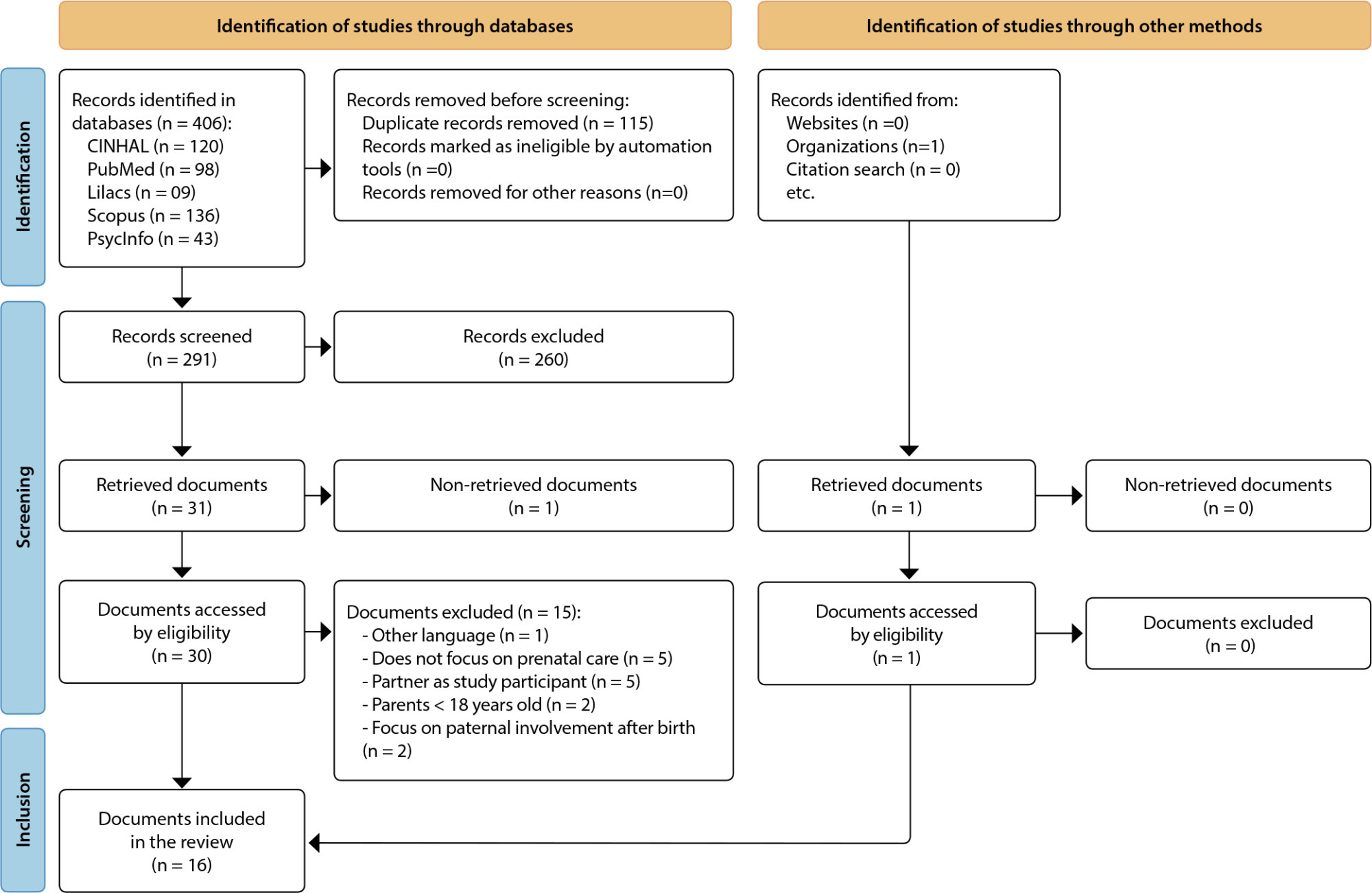
-
ORIGINAL ARTICLE05-03-2024
Josicélia Dumêt Fernandes’ professional trajectory: contributions to psychiatric and mental health nursing
Revista Brasileira de Enfermagem. 2024;77(1):e20230174
Abstract
ORIGINAL ARTICLEJosicélia Dumêt Fernandes’ professional trajectory: contributions to psychiatric and mental health nursing
Revista Brasileira de Enfermagem. 2024;77(1):e20230174
DOI 10.1590/0034-7167-2023-0174
Views0See moreABSTRACT
Objectives:
to analyze nurse Josicélia Dumêt Fernandes’ life story, with emphasis on her work in the psychiatry and mental health fields.
Methods:
historical, qualitative research. Semi-structured interviews and documentary research were used as data collection techniques, collected from September to October 2021. For data analysis, we opted for the content analysis method and comparison with the Foucauldian philosophical framework.
Results:
four categories emerged: Transforming herself and mental health practices; (Re)framing professional practice; Nursing practice and power relations; and The paths and implications in the psychiatry and mental health fields.
Final Considerations:
the study of the biographer demonstrates a search for transformation of herself and mental health practices, with a rupture in paradigms and reframing of her practice in psychiatry and mental health.
-
ORIGINAL ARTICLE05-03-2024
Psychometric properties of the Chilean version of the quality of life questionnaire for multiple myeloma
Revista Brasileira de Enfermagem. 2024;77(1):e20230100
Abstract
ORIGINAL ARTICLEPsychometric properties of the Chilean version of the quality of life questionnaire for multiple myeloma
Revista Brasileira de Enfermagem. 2024;77(1):e20230100
DOI 10.1590/0034-7167-2023-0100
Views0See moreABSTRACT
Objectives:
To evaluate the internal consistency and construct validity of the QLQ-MY20 for assessing the quality of life in multiple myeloma survivors in Chile.
Methods:
This was a cross-sectional study conducted between March 2020 and December 2022. It involved 118 individuals from two public hospitals. The QLQ-C30 and QLQ-MY20 questionnaires were used. Internal consistency was assessed using Cronbach’s alpha(α), and construct validity was evaluated through hypothesis testing (Mann-Whitney and Spearman correlation).
Results:
The average age of participants was 67.2 years (SD=9.2). Internal consistency for the complete scale was α=0.779, for the “disease symptoms” dimension α=0.671, for the “side effects of treatments” dimension α=0.538, and for the “future perspective” dimension α=0.670. Four of the five construct validity hypotheses were confirmed: women, individuals with worse performance status, those with pain, and those with worse fatigue showed more symptoms.
Conclusions:
The Chilean version of the QLQ-MY20 demonstrates adequate internal consistency and construct validity.
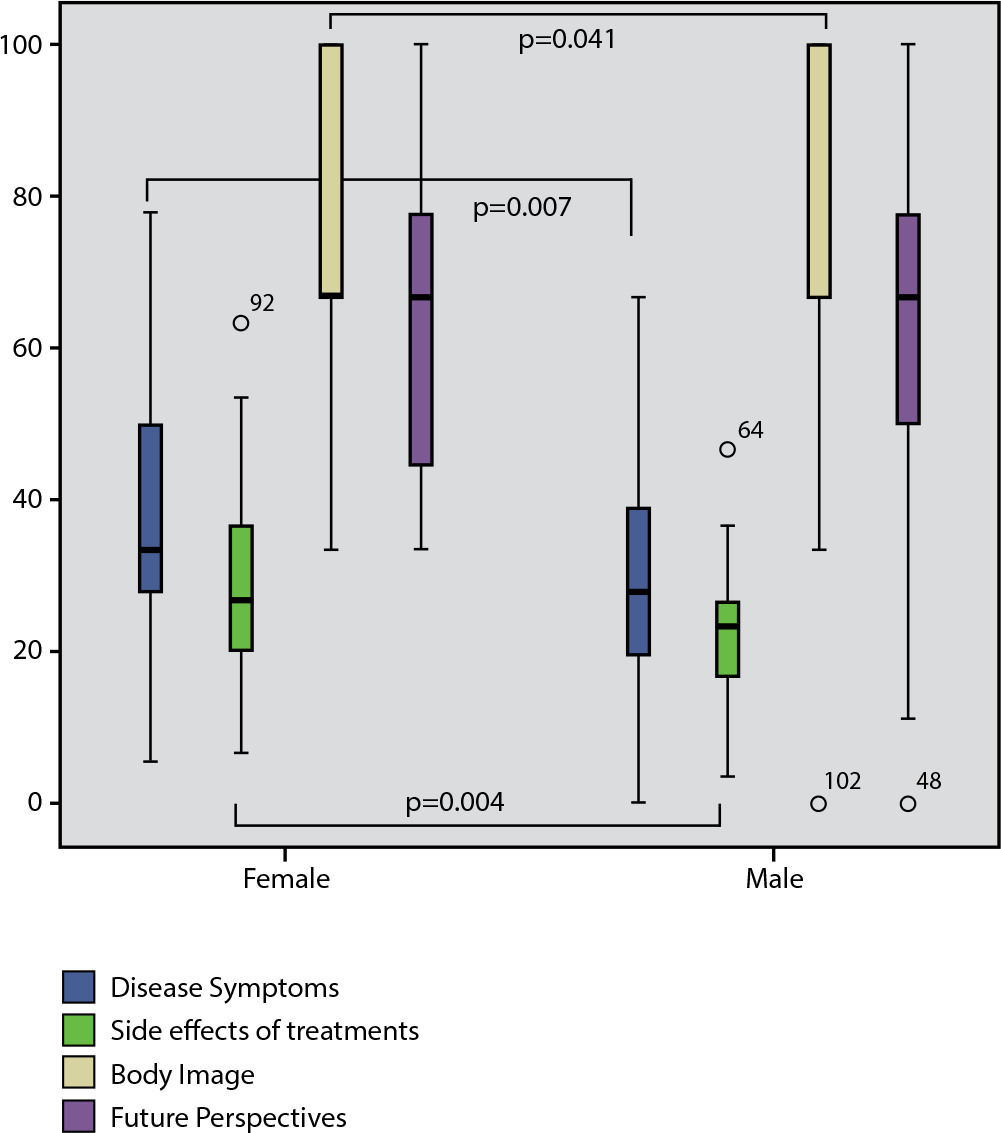
-
ORIGINAL ARTICLE05-03-2024
Pregnancy loss in women with systemic lupus erythematosus: Grounded Theory
Revista Brasileira de Enfermagem. 2024;77(1):e20230225
Abstract
ORIGINAL ARTICLEPregnancy loss in women with systemic lupus erythematosus: Grounded Theory
Revista Brasileira de Enfermagem. 2024;77(1):e20230225
DOI 10.1590/0034-7167-2023-0225
Views0See moreABSTRACT
Objective:
to learn the meanings attributed to pregnancy loss by women with Lupus.
Method:
qualitative research, based on Symbolic Interactionism and Grounded Theory. Data collection took place between January and August 2022 through in-depth interviews. Data analysis went through the stages of initial and focused coding.
Results:
seventeen women participated. The central phenomenon “The climb to motherhood: falls and overcoming” was constructed, consisting of three categories: “Falling to the ground during the climb: the experience of pregnancy loss”; “Getting up and following the path: new attempts to conceive”; and “Remembering the journey: meanings attributed to pregnancy losses”.
Final considerations:
experiencing pregnancy is, analogously, like climbing a mountain, where obstacles need to be overcome to reach the summit. The experience of pregnancy loss is seen as complex, especially when there is fragility in healthcare and a lack of awareness regarding feelings of loss and grief.
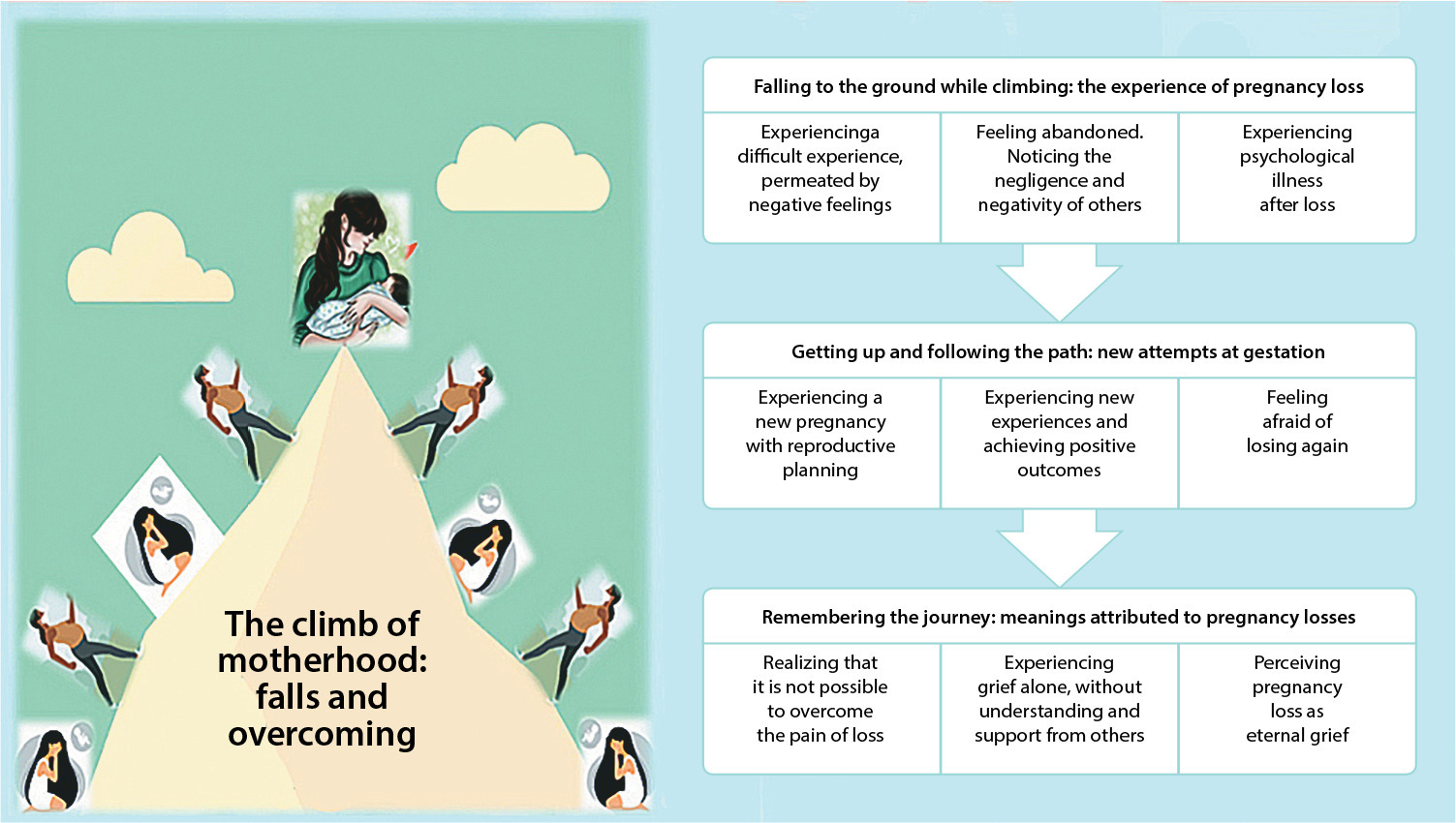
-
05-03-2024
Preditores de volume excessivo de líquidos em pacientes em hemodiálise: estudo observacional
Revista Brasileira de Enfermagem. 2024;77(1):e20220816
Abstract
Preditores de volume excessivo de líquidos em pacientes em hemodiálise: estudo observacional
Revista Brasileira de Enfermagem. 2024;77(1):e20220816
DOI 10.1590/0034-7167-2022-0816
Views0See moreRESUMEN
Objetivos:
evaluar los factores de riesgo del exceso de volumen de líquido en pacientes en hemodiálisis.
Métodos:
estudio retrospectivo de casos y controles. Se incluyeron 392 pacientes (196 casos y 196 controles) de dos centros de hemodiálisis. Se evaluaron datos sociodemográficos y 23 factores de riesgo de exceso de volumen de líquido mediante un formulario de recolección de datos. Los datos se analizaron mediante un modelo de regresión logística multivariado.
Resultados:
factores de riesgo conocimiento insuficiente (OR=2,06), ingesta excesiva de líquidos (OR=2,33), retirada inadecuada de líquidos durante la hemodiálisis (OR=2,62) e ingesta excesiva de sodio (OR=1,91) pueden aumentar aproximadamente dos veces la posibilidad de que se produzca un exceso de volumen de líquido en pacientes en hemodiálisis. La educación (OR=0,95) y la edad (OR=0,97) son factores protectores del volumen excesivo de líquido.
Conclusiones:
conocer estos factores de riesgo puede ayudar a las enfermeras a realizar una inferencia diagnóstica precisa y rápida del riesgo de volumen excesivo de líquidos.
-
REVIEW05-03-2024
Nursing interventions to empower the family caregiver of person with lower limb amputation: scoping review
Revista Brasileira de Enfermagem. 2024;77(1):e20230264
Abstract
REVIEWNursing interventions to empower the family caregiver of person with lower limb amputation: scoping review
Revista Brasileira de Enfermagem. 2024;77(1):e20230264
DOI 10.1590/0034-7167-2023-0264
Views0See moreABSTRACT
Objectives:
to map nursing interventions that empower the Family caregiver of the person with lower limb amputation for is role.
Methods:
scoping review guided by Joanna Briggs Institute methodology conducted in different databases (including gray literature).
Results:
six studies published between 2009 and 2021 were included. Interventions of counselling and support for patients and family; peer support interventions performed by a certified pair; involvement of caregivers or family members in support groups; and key interventions for patient and family caregiver psychological balance. Two studies discussed the importance of caregiver and amputee training and development of coping skills. Another study recommended Interventions of informative support for caregivers regarding care for the amputee and adaptation to home.
Conclusions:
results of this review allow the identification of recommendations (guidelines) for practice and recommendations/suggestions for interventions according with identified needs of family caregivers of patients with lower limb amputation.
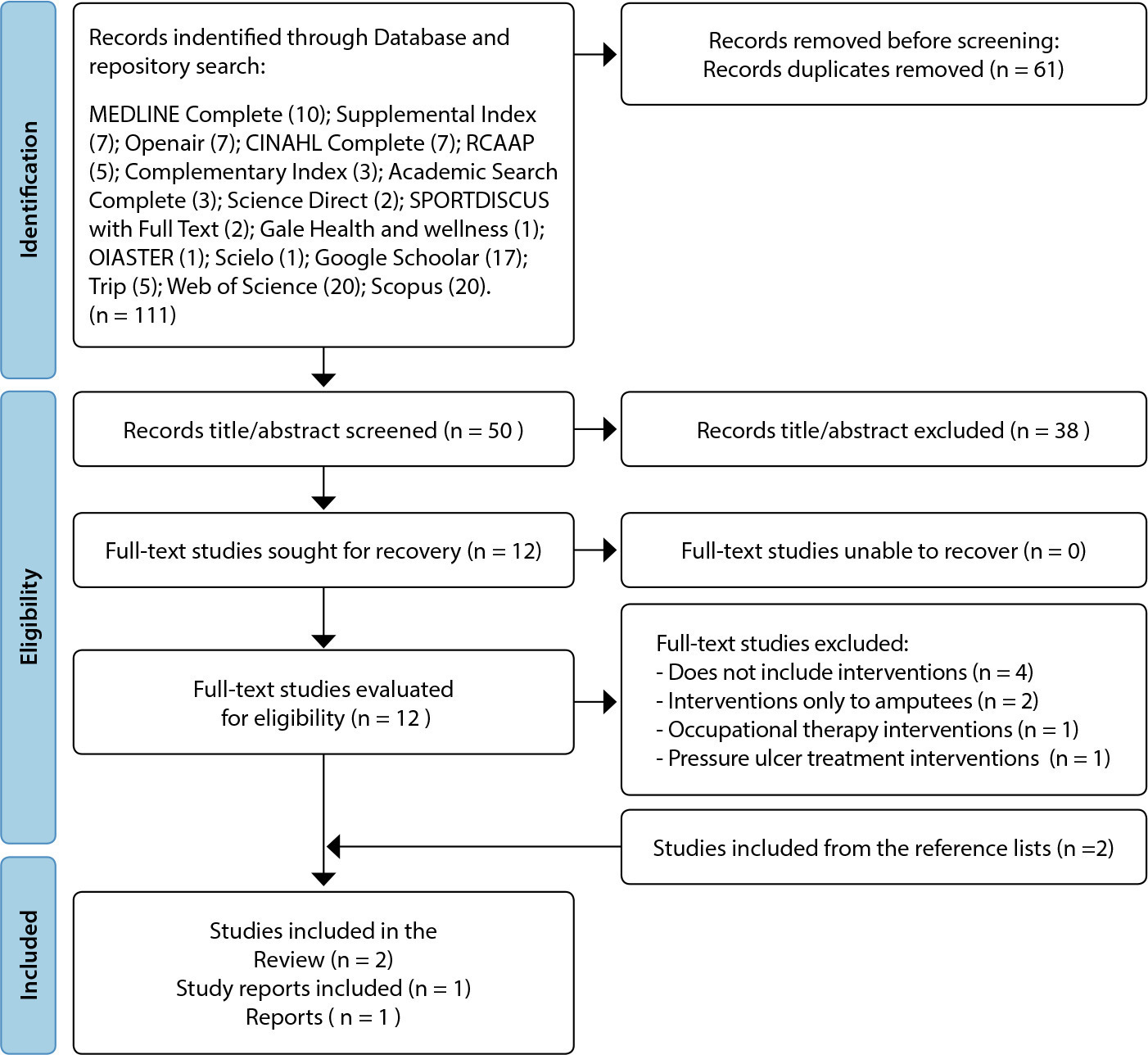
-
05-03-2024
Intervenções de Enfermagem para capacitar o cuidador familiar de uma pessoa com amputação de membro inferior: revisão de escopo
Revista Brasileira de Enfermagem. 2024;77(1):e20230264
Abstract
Intervenções de Enfermagem para capacitar o cuidador familiar de uma pessoa com amputação de membro inferior: revisão de escopo
Revista Brasileira de Enfermagem. 2024;77(1):e20230264
DOI 10.1590/0034-7167-2023-0264
Views0See moreRESUMEN
Objetivos:
mapear intervenciones de enfermería que capaciten al cuidador familiar de la persona con amputación de miembro inferior para su rol.
Métodos:
es una revisión de alcance guiada por la metodología del Instituto Joanna Briggs, llevada a cabo en diferentes bases de datos (incluyendo literatura gris).
Resultados:
se tuvieron en cuenta seis estudios publicados entre 2009 y 2021, a saber: intervenciones de asesoramiento y apoyo para pacientes y familiares; intervenciones de apoyo entre iguales realizadas por un par de profesionales certificados; participación de cuidadores o familiares en grupos de apoyo e intervenciones clave para el equilibrio psicológico del paciente y del cuidador familiar. Dos estudios analizaron la importancia de la formación del cuidador y del amputado y del desarrollo de habilidades de afrontamiento. Otro estudio recomendó intervenciones de apoyo informativo para los cuidadores en relación con el cuidado del amputado y su adaptación a la vida hogareña.
Conclusiones:
los resultados de esta revisión permiten identificar recomendaciones/directrices para la práctica y recomendaciones/sugerencias de intervenciones según las necesidades identificadas de los cuidadores familiares de pacientes con amputación de miembros inferiores.
-
05-03-2024
Propiedades psicométricas de la versión chilena del cuestionario de calidad de vida para mieloma múltiple
Revista Brasileira de Enfermagem. 2024;77(1):e20230100
Abstract
Propiedades psicométricas de la versión chilena del cuestionario de calidad de vida para mieloma múltiple
Revista Brasileira de Enfermagem. 2024;77(1):e20230100
DOI 10.1590/0034-7167-2023-0100es
Views0See moreRESUMEN
Objetivos:
Evaluar consistencia interna y validez de constructo del QLQ-MY20 para valoración de calidad de vida en sobrevivientes de mieloma múltiple en Chile.
Métodos:
Estudio transversal, realizado entre marzo 2020 y diciembre 2022. Participaron 118 personas de dos hospitales públicos. Se utilizaron los cuestionarios QLQ-C30 y QLQ-MY20. Fueron evaluadas la consistencia interna con alfa de Cronbach (α) y validez de constructo mediante pruebas de hipótesis (Mann Whitney y correlación de Spearman).
Resultados:
El promedio de edad de los participantes era 67,2 (DE=9,2) años. Consistencia interna para escala completa (α=0,779), dimensión “síntomas de la enfermedad” (α=0,671), dimensión “efectos secundarios de los tratamientos” (α=0,538) y dimensión “perspectiva de futuro” (α=0,670). Se comprobaron cuatro de las cinco hipótesis de la validez de constructo: presentaron más síntomas las mujeres, personas con peor performance estatus, con dolor y con peor fatiga.
Conclusiones:
La versión chilena del QLQ-MY20 presenta adecuada consistencia interna y validez de constructo.
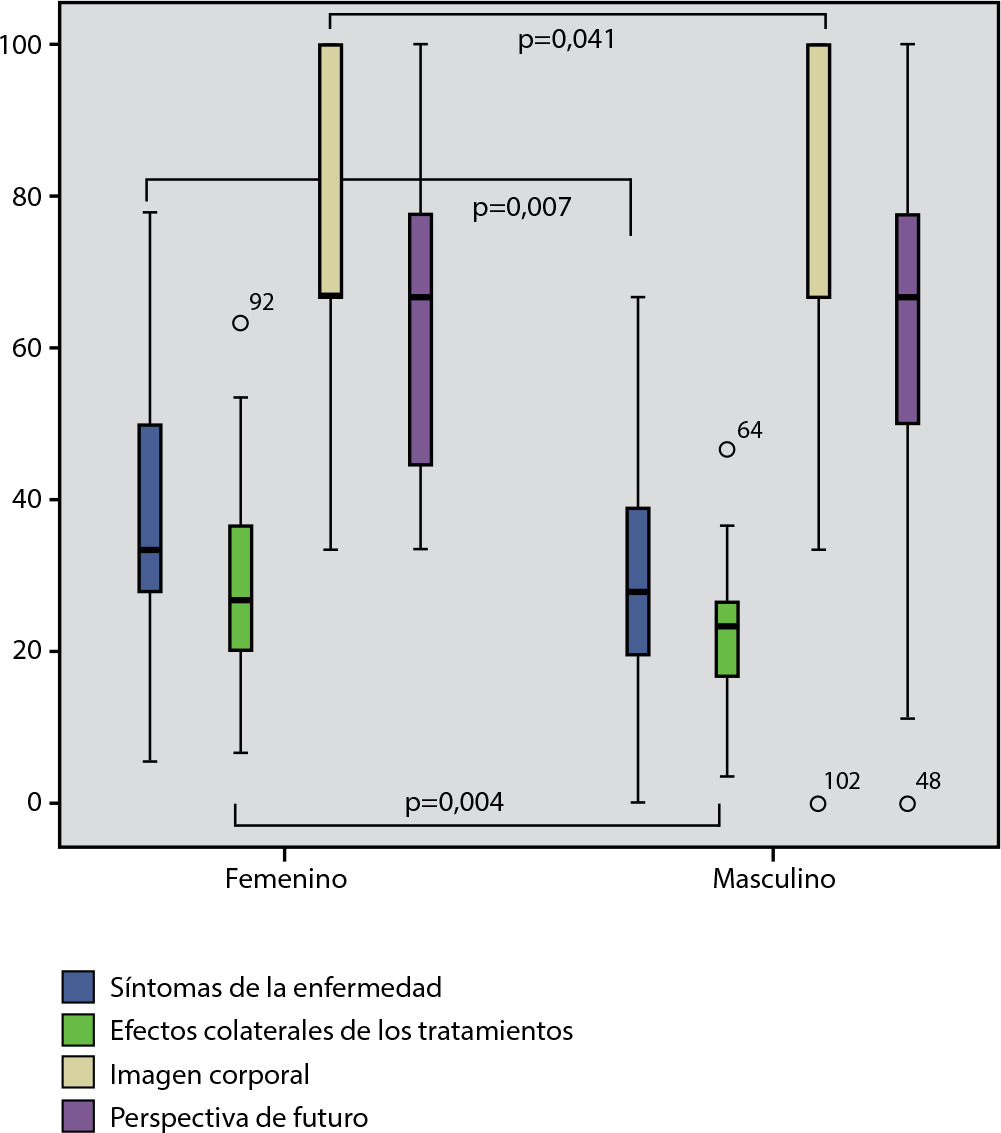
-
ORIGINAL ARTICLE07-08-2020
No to distance education! Production of meaning of discourses of nursing representative entities
Revista Brasileira de Enfermagem. 2020;73(5):e20190465
Abstract
ORIGINAL ARTICLENo to distance education! Production of meaning of discourses of nursing representative entities
Revista Brasileira de Enfermagem. 2020;73(5):e20190465
DOI 10.1590/0034-7167-2019-0465
Views0See moreABSTRACT
Objectives:
to analyze the processes of production of meanings, based on the positions of Brazilian nursing representative entities, on distance education, considering the implications for nursing as a discipline, profession and work.
Methods:
this documentary research was carried out in sources from the Federal Nursing Council and Associação Brasileira de Enfermagem, from 2015 to 2018. Data were examined from discourse analysis, using paraphrase and polysemy as analytical devices.
Results:
they were organized based on the effects of meanings produced and affiliated to two analytical categories: “Forms of mobilization and operating entities” and “Basis and justifications for the positions”.
Final Considerations:
the discourses signal concern about the future training of new professionals. Resistance, participation, visibility, broad and emphatic debate on the topic are shown as strategies for coping and defending a training process less captured by neoliberal logic, and more relational and committed to the quality of health care.

-
ORIGINAL ARTICLE07-13-2020
Culture of patient safety in hospital units of gynecology and obstetrics: a cross-sectional study
Revista Brasileira de Enfermagem. 2020;73(5):e20190576
Abstract
ORIGINAL ARTICLECulture of patient safety in hospital units of gynecology and obstetrics: a cross-sectional study
Revista Brasileira de Enfermagem. 2020;73(5):e20190576
DOI 10.1590/0034-7167-2019-0576
Views0See moreABSTRACT
Objectives:
to assess the patient safety culture of the health team working in three maternity hospitals.
Methods:
observational, cross-sectional, comparative study. 301 professionals participated in the study. The Hospital Survey on Patient Safety Culture questionnaire validated in Brazil was used. For data analysis, it was considered a strong area in the patient safety culture when positive responses reached over 75%; and areas that need improvement when positive responses have reached less than 50%. To compare the results, standard deviation and thumb rule were used.
Results:
of the 12 dimensions of patient safety culture, none obtained a score above 75%, with nine dimensions scoring between 19% and 43% and three dimensions between 55% and 57%.
Conclusions:
no strong dimensions for safety culture were identified in the three maternity hospitals. It is believed that these results may contribute to the development of policies that promote a culture of safety in institutions.
-
REVIEW07-13-2020
The quality of life of family health professionals: a systematic review and meta-synthesis
Revista Brasileira de Enfermagem. 2020;73(5):e20190645
Abstract
REVIEWThe quality of life of family health professionals: a systematic review and meta-synthesis
Revista Brasileira de Enfermagem. 2020;73(5):e20190645
DOI 10.1590/0034-7167-2019-0645
Views1See moreABSTRACT
Objectives:
to perform a systematic review and meta-synthesis of qualitative studies about the work-related quality of life of Family Health Strategy professionals.
Methods:
this systematic review was developed to answer the following PVO question: “Which factors (variables) are associated with the work-related quality of life (outcome) of Family Health Strategy professionals (population)?” The PubMed, Scopus, Embase, SciELO, Web of Science, LILACS, Science Direct, OpenThesis, OpenGrey, and OATD databases were selected. The meta-synthesis analyzed the main codes and secondary codes of all included studies.
Results:
the database search resulted in 1,744 reports; six were considered eligible for the meta-synthesis. Four factors were considered for the quality of work life: working conditions; work processes; interpersonal relationships; and personal aspects.
Conclusions:
although this study confirms the adequacy of aspects commonly related to the quality of work life, other factors are important in the case of FHS professionals, especially work context.

-
LETTER TO THE EDITOR07-01-2020
Letter to the Editor: doubts and considerations about Coronary Syndrome
Revista Brasileira de Enfermagem. 2020;73(5):e2020730502c
Abstract
LETTER TO THE EDITORLetter to the Editor: doubts and considerations about Coronary Syndrome
Revista Brasileira de Enfermagem. 2020;73(5):e2020730502c
DOI 10.1590/0034-7167.2020730502c
Views0Dear Editor,We wrote this letter referring to the article “Impact of anxiety and depression on morbidity and mortality of patients with coronary syndrome”() to make some comments, in order to clarify doubts that we were missing from answering. We have already made it clear that our intention is not to question the work of the […]See more -
ORIGINAL ARTICLE08-10-2020
Workers’ Health in Brazil: Accidents recorded by Social Security from 2008 to 2014
Revista Brasileira de Enfermagem. 2020;73(6):e20180892
Abstract
ORIGINAL ARTICLEWorkers’ Health in Brazil: Accidents recorded by Social Security from 2008 to 2014
Revista Brasileira de Enfermagem. 2020;73(6):e20180892
DOI 10.1590/0034-7167-2018-0892
Views0See moreABSTRACT
Objectives:
to analyze the incidence of occupational accidents in Brazil, recorded by Social Security according to the geographic regions, age group, gender and their prevalence according to the causes and branch of economic activity.
Methods:
ecological descriptive study with time series analysis from 2008 to 2014. Data on the beginning and end of the historical series were compared in each ecological unit studied.
Results:
the South and Southeast regions, male, between 20 and 49 years of age presented the highest falls in incidence. 70.87% of the causes occurred in group XIX of ICD-10. The economic activity with the highest prevalence of accidents was the manufacturing industry.
Conclusions:
accidents at work have decreased in Brazil, however, the incidence is still high. Advances need to be made in the recording of accidents and in the prevention and surveillance of workers’ health.
-
ORIGINAL ARTICLE08-10-2020
Neonatal near miss in the intensive care unit
Revista Brasileira de Enfermagem. 2020;73(6):e20180931
Abstract
ORIGINAL ARTICLENeonatal near miss in the intensive care unit
Revista Brasileira de Enfermagem. 2020;73(6):e20180931
DOI 10.1590/0034-7167-2018-0931
Views0See moreABSTRACT
Objective:
To analyze near miss cases among newborns hospitalized in the Intensive Care Unit.
Methods:
An observational, cross-sectional, retrospective study using the STROBE guideline. Data were collected from 1,101 records of live births (newborns). Statistical analysis used the Epi-Info program 3.3.2 and Chi-square and Fisher’s exact tests.
Results:
A total of 162 newborns were hospitalized, of which 63 had at least one criterion of near miss. The variables that remained associated with neonatal near miss were weight <1.750 g, gestational age <33 weeks and Apgar at 5 minutes <7, pragmatic criteria to identify cases of neonatal near miss morbidity.
Conclusion:
Prematurity and low birth weight were the factors that contributed most to the near miss outcome among newborns hospitalized in intensive care, a rate two and a half times higher than the number of deaths, according to scientific evidence.

-
08-10-2020
Care for the critical patient undergoing point-of-care testing: integrative review
Revista Brasileira de Enfermagem. 2020;73(6):e20180948
Abstract
Care for the critical patient undergoing point-of-care testing: integrative review
Revista Brasileira de Enfermagem. 2020;73(6):e20180948
DOI 10.1590/0034-7167-2018-0948
Views0See moreABSTRACT
Objective:
to identify, based on the evidence, point-of-care testing in bedbound in critically ill patients.
Method:
integrative review, carried out through search in Pubmed, Virtual Health Library, Joanna Briggs Institute, The British Institute of Radiology, Brazilian Radiology, and Google Scholar databases. We used the PICO research strategy and selected articles published from 2013 onwards, which presented information about point-of-care testing.
Results:
the different interventions found in the analysis of the 23 selected articles allowed the thematic grouping of care related to safety in communication, patient identification, care with devices, and the prevention and control of infection, which can be used in point-of-care testing.
Final considerations:
The care described in the evidence provided support for validating a safe care protocol for critically ill patients undergoing imaging studies in bed.

-
ORIGINAL ARTICLE08-10-2020
Risk management in the scope of nursing professionals in the hospital setting
Revista Brasileira de Enfermagem. 2020;73(6):e20190303
Abstract
ORIGINAL ARTICLERisk management in the scope of nursing professionals in the hospital setting
Revista Brasileira de Enfermagem. 2020;73(6):e20190303
DOI 10.1590/0034-7167-2019-0303
Views1See moreABSTRACT
Objective:
To evaluate occupational hazards affecting nursing professionals’ health in the environment of the hospital.
Method:
Descriptive-exploratory research with a qualitative approach.
Results:
The main hazards affecting nursing professionals were work overload due to the large number of patients or the small number of professionals, inadequate infrastructure, and insufficient organizational management. It became evident the work interferences in the nursing professional’s life are enormous. Despite the existence of health occupational risk management, there is still a shortage of bigger endeavors to be employed in the hospital routine. As a main result of the study, a Standard Operational Protocol (SOP) for biological risk was created to be applied in a hospital setting.
Conclusion:
Based on the identification of occupational hazards, it was suggested the Standard Operational Protocol which should be standardized to manage biological occupational hazards, to ensure the adequate flow of procedures after the exposure, as well as the occupational safety of nursing professionals.
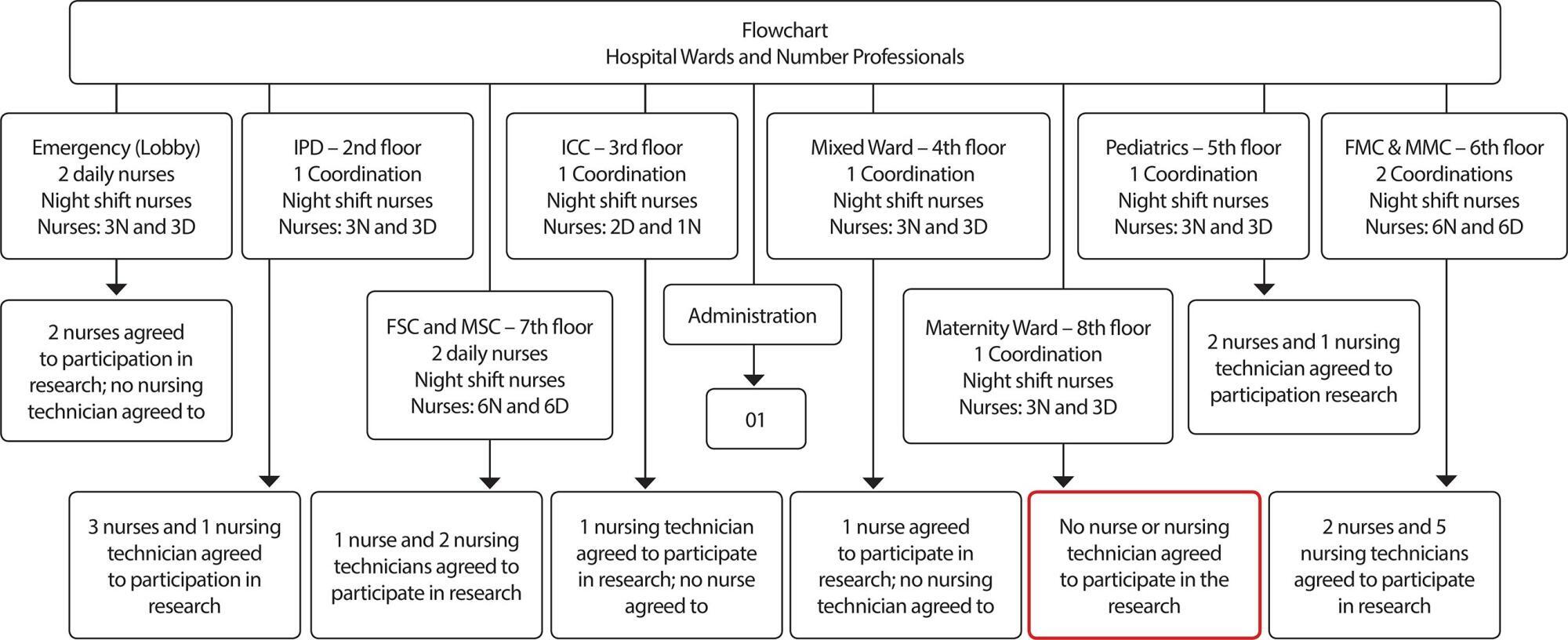
-
REFLECTION07-01-2020
How to translate scientific knowledge into practice? Concepts, models and application
Revista Brasileira de Enfermagem. 2020;73(5):e20190179
Abstract
REFLECTIONHow to translate scientific knowledge into practice? Concepts, models and application
Revista Brasileira de Enfermagem. 2020;73(5):e20190179
DOI 10.1590/0034-7167-2019-0179
Views0See moreABSTRACT
Objectives:
to present the concept of Knowledge Translation and Exchange as it has been used in the international literature and in Canada, particularly. Next, to describe a renowned conceptual model to guide its implementation, entitled Knowledge-to-Action Cycle.
Results:
we described the use of the model in the context of the municipal primary health care system in southern Brazil for the implementation of pain management strategies during vaccination.
Conclusions:
in this theoretical reflection, we argue that in order to promote health equity and quality of care in the Unified Health System (Brazilian SUS) it is important to translate scientific knowledge to various practice settings and create opportunities for exchange with users of this knowledge, such as health professionals, managers, policy makers, patients, family members and other stakeholders.

-
ORIGINAL ARTICLE08-18-2021
Effects of floral therapy on labor and birth: a randomized clinical trial
Revista Brasileira de Enfermagem. 2021;74:e20210079
Abstract
ORIGINAL ARTICLEEffects of floral therapy on labor and birth: a randomized clinical trial
Revista Brasileira de Enfermagem. 2021;74:e20210079
DOI 10.1590/0034-7167-2021-0079
Views0INTRODUCTIONThe Policy of Comprehensive Attention to Women’s Health focuses on improving obstetric care. One of the points observed in the Program of Comprehensive Attention to Women’s Health is the monitoring of pacts to reduce the rate of cesarean sections in hospitals of the Brazilian Unified Health System (SUS – Sistema Único de Saúde), rescuing the […]See more
-
ORIGINAL ARTICLE08-14-2020
Education to prevent ventilator-associated pneumonia in intensive care unit
Revista Brasileira de Enfermagem. 2020;73(6):e20190477
Abstract
ORIGINAL ARTICLEEducation to prevent ventilator-associated pneumonia in intensive care unit
Revista Brasileira de Enfermagem. 2020;73(6):e20190477
DOI 10.1590/0034-7167-2019-0477
Views0INTRODUCTIONVentilator-Associated Pneumonia (VAP) is one of the complications related to the care of patients hospitalized in the Intensive Care Unit (ICU), which, according to consulted authors, exceeds the mortality rates of other Healthcare Related Infections (HRI). VAP is the second most frequent infection in patients admitted to the ICU, as well as the most prevalent […]See more
-
ORIGINAL ARTICLE10-21-2019
Burnout assessment in nurses from a general emergency service
Revista Brasileira de Enfermagem. 2019;72(6):1457-1463
Abstract
ORIGINAL ARTICLEBurnout assessment in nurses from a general emergency service
Revista Brasileira de Enfermagem. 2019;72(6):1457-1463
DOI 10.1590/0034-7167-2017-0870
Views0See moreABSTRACT
Objective:
To assess the level of Burnout among nurses in a general emergency department.
Method:
Quantitative, descriptive, correlational and cross-sectional study. 32 nurses from a general adult emergency department answered a questionnaire to evaluate Burnout. (Copenhagen Burnout Inventory).
Result:
It was verified that 59.4% of the nurses presented total Burnout. Work-related burnout was the subscale with the highest average score. It was found that the lower the age and the longer the time working in the institution, the higher the level of Burnout. Longer professional experience was related to lower levels of Burnout. There were also higher scores of Burnout among participants who thought about changing their profession, their institution or their service.
Conclusion:
The prevalence of Burnout is high. Professional Burnout was the most critical subscale. Age and the current work are the subscales that most influence perceived Burnout
-
ORIGINAL ARTICLE07-10-2020
Nursing appeals on social media in times of coronavirus
Revista Brasileira de Enfermagem. 2020;73:e20200225
Abstract
ORIGINAL ARTICLENursing appeals on social media in times of coronavirus
Revista Brasileira de Enfermagem. 2020;73:e20200225
DOI 10.1590/0034-7167-2020-0225
Views0See moreABSTRACT
Objective:
to know and analyze the nursing appeals on social media during the COVID-19 pandemic.
Method:
it is a documentary, qualitative, descriptive, and exploratory research with data collected in publications in two social media. Two hundred ninety-five publications of nursing professionals published on Twitter and Instagram between March 11 and 20, 2020 were submitted to content analysis using ATLAS.ti resources.
Results:
four thematic categories emerged: #stayathome, #whereismyPPE, #nowweareheroes, #nothingnewinthefrontline, according to frequency of communications. The appeals show a relationship with the social relevance of nursing professional work and with the conditions required for its exercise.
Final considerations:
old and new challenges of the profession were placed on the agenda in social media, especially related to the workforce and instruments of labor. These speeches can serve as a foundation for policies to improve working conditions and promote appreciation of the profession.

-
REFLECTION10-21-2019
Clinical supervision and preceptorship/tutorship: contributions to the Supervised Curricular Internship in Nursing Education
Revista Brasileira de Enfermagem. 2019;72(6):1730-1735
Abstract
REFLECTIONClinical supervision and preceptorship/tutorship: contributions to the Supervised Curricular Internship in Nursing Education
Revista Brasileira de Enfermagem. 2019;72(6):1730-1735
DOI 10.1590/0034-7167-2018-0785
Views0See moreABSTRACT
Objective:
To reflect on the contributions of the clinical supervision and preceptorship/tutorship as means to approach and engage nurses of healthcare services in activities related to the Supervised Curricular Internship, discussing conceptual, theoretical, and practical approaches for higher education in nursing.
Method:
This is a reflection based on the discursive formulation concerning clinical supervision and preceptorship/tutorship.
Results:
Clinical supervision has been widely used by international healthcare institutions to qualify the work processes of nurses, supporting their self-development. Currently, is has been supporting the work of nurses who are preceptors/tutors and monitors students on clinical internships.
Final considerations:
The clinical supervision of nursing students features a robust and effective strategy for the development of interns and for the completion of the teaching-service integration.
-
08-19-2019
Degree in Nursing: education through problem-based learning
Revista Brasileira de Enfermagem. 2019;72(4):1071-1077
Abstract
Degree in Nursing: education through problem-based learning
Revista Brasileira de Enfermagem. 2019;72(4):1071-1077
DOI 10.1590/0034-7167-2018-0298
Views0See moreABSTRACT
Objective:
To describe how undergraduate courses in Nursing are using the problem-based learning (PBL).
Method:
Integrative literature review, from searches in the databases Education Resources Information Center (ERIC), Latin American and Caribbean Health Sciences Literature (Lilacs), and PubMed, from 2010 to 2015. 36 articles were analyzed.
Results:
A teaching method used in all continents, the PBL enables improvement of the critical thinking, autonomy, motivation for learning, active search attitude, ability to work in teams, and problem-solving. Difficulties and challenges relate to the training of students and teachers to understand the principles of the method.
Final considerations:
The benefits of PBL coincide with the needs of nursing training, but its applicability demands constant review in seeking to develop the skills necessary for this training.

-
ORIGINAL ARTICLE06-01-2020
Construction and validation of an educational technology for mother-child bond in the neonatal intensive care unit
Revista Brasileira de Enfermagem. 2020;73(4):e20190083
Abstract
ORIGINAL ARTICLEConstruction and validation of an educational technology for mother-child bond in the neonatal intensive care unit
Revista Brasileira de Enfermagem. 2020;73(4):e20190083
DOI 10.1590/0034-7167-2019-0083
Views0See moreABSTRACT
Objectives:
to describe the process of construction and validation of an educational booklet to promote bonding between mothers and newborns in a Neonatal Intensive Care Unit.
Methods:
methodological study developed through data collection in the literature and with the target audience; construction of the booklet; qualification of the material through validation by judges (health and communication experts/designer) and assessment by the target audience (mothers of at-risk newborns). Data were analyzed descriptively.
Results:
booklet content was validated, obtaining an overall Content Validity Index of 0.92. Appearance was rated “Superior” with 80% percentage. Mothers performed an assessment with 100% agreement between the items.
Conclusions:
the booklet was validated in all domains assessed and can be used by mothers with children hospitalized in the Neonatal Unit.

Search
Search in:
Nuvem de Tags
Adolescente (85) Atenção Primária à Saúde (239) COVID-19 (91) Criança (91) Cuidados de Enfermagem (269) Educação em Enfermagem (151) Educação em Saúde (139) Enfermagem (930) Enfermagem Pediátrica (86) Estudantes de Enfermagem (77) Estudos de Validação (131) Família (87) Idoso (208) Promoção da Saúde (99) Qualidade de Vida (104) Saúde do Trabalhador (86) Saúde Mental (145) Saúde Pública (82) Segurança do Paciente (150) Tecnologia Educacional (100)



